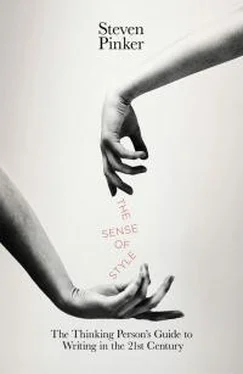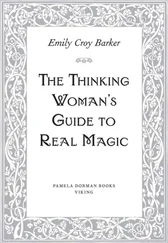In recent years, an increasing number of psychologists and linguists have turned their attention to the problem of child language acquisition. In this article, recent research on this process will be reviewed.
No offense, but very few people are interested in how professors spend their time. Classic style ignores the hired help and looks directly at what they are being paid to study:
All children acquire the ability to speak a language without explicit lessons. How do they accomplish this feat?
To be fair, sometimes the topic of conversation really is the activity of researchers, such as an overview intended to introduce graduate students or other insiders to the scholarly literature in their chosen profession. But researchers are apt to lose sight of whom they are writing for, and narcissistically describe the obsessions of their guild rather than what the audience really wants to know. Professional narcissism is by no means confined to academia. Journalists assigned to an issue often cover the coverage, creating the notorious media echo chamber. Museum signs explain how the shard in the showcase fits into a classification of pottery styles rather than who made it or what it was used for. Music and movie guides are dominated by data on how much money a work grossed the weekend it was released, or how many weeks it spent in the theaters or on the charts. Governments and corporations organize their Web sites around their bureaucratic structure rather than the kinds of information a user seeks.
Self-conscious writers are also apt to whinge about how what they’re about to do is so terribly difficult and complicated and controversial:
What are intractable conflicts? “Intractability” is a controversial concept, which means different things to different people.
Resilience to stress is a complex multidimensional construct. Although there is no one universally accepted definition of resilience, it is generally understood as the ability to bounce back from hardship and trauma.
The problem of language acquisition is extremely complex. It is difficult to give precise definitions of the concept of “language” and the concept of “acquisition” and the concept of “children.” There is much uncertainty about the interpretation of experimental data and a great deal of controversy surrounding the theories. More research needs to be done.
The last of these quotations is a pastiche, but the other two are real, and all are typical of the inward-looking style that makes academic writing so tedious. In classic style, the writer credits the reader with enough intelligence to realize that many concepts aren’t easy to define and that many controversies aren’t easy to resolve. She is there to see what the writer will do about it.
Another bad habit of self-conscious writing is the prissy use of quotation marks—sometimes called shudder quotes or scare quotes—to distance the writer from a common idiom:
By combining forces, you could make the “whole more than the sum of its parts.”
But this is not the “take home message.”
They may be able to “think outside the box” even when everybody else has a fixed approach, but they do not always note when “enough is enough.”
It began as a movement led by a few “young turks” against an “old guard” who dominated the profession.
She is a “quick study” and has been able to educate herself in virtually any area that interests her.
The authors seem to be saying, “I couldn’t think of a more dignified way of putting this, but please don’t think I’m a flibbertigibbet who talks this way; I really am a serious scholar.” The problem goes beyond prissiness. In the last example, taken from a letter of recommendation, are we supposed to think that the student is a quick study, or that she is a “quick study”—someone who is alleged or rumored by others to be a quick study, but really isn’t? The use of shudder quotes is taken to an extreme in the agonizingly self-conscious, defiantly un-classic style of postmodernism, which rejects the possibility that any word can ever refer to anything, or even that there is an objectively existing world for words to refer to. Hence the 2004 headline in the satirical newspaper The Onion on the passing of postmodernism’s leading light: JACQUES DERRIDA “DIES.”
Quotation marks have a number of legitimate uses, such as reproducing someone else’s words ( She said, “Fiddlesticks!” ), mentioning a word as a word rather than using it to convey its meaning ( The New York Times uses “millenniums,” not “millennia” ), and signaling that the writer does not accept the meaning of a word as it is being used by others in this context ( They executed their sister to preserve the family’s “honor” ). Squeamishness about one’s own choice of words is not among them. Classic style is confident about its own voice. If you’re not comfortable using an expression without apologetic quotation marks, you probably shouldn’t be using it at all.
And then there’s compulsive hedging. Many writers cushion their prose with wads of fluff that imply that they are not willing to stand behind what they are saying, including almost, apparently, comparatively, fairly, in part, nearly, partially, predominantly, presumably, rather, relatively, seemingly, so to speak, somewhat, sort of, to a certain degree, to some extent, and the ubiquitous I would argue (does this mean that you would argue for your position if things were different, but are not willing to argue for it now?). Consider the “virtually” in the letter of recommendation excerpted above. Did the writer really mean to say that there are some areas the student was interested in where she didn’t bother to educate herself, or perhaps that she tried to educate herself in those areas but lacked the competence to do so? And then there’s the scientist who showed me a picture of her four-year-old daughter and said, beaming, “We virtually adore her.”
Writers acquire the hedge habit to conform to the bureaucratic imperative that’s abbreviated as CYA, which I’ll spell out as Cover Your Anatomy. They hope it will get them off the hook, or at least allow them to plead guilty to a lesser charge, should a critic ever try to prove them wrong. It’s the same reason that lawsuit-wary journalists drizzle the words allegedly and reportedly throughout their copy, as in The alleged victim was found lying in a pool of blood with a knife in his back.
There is an alternative slogan to Cover Your Anatomy: So Sue Me. A classic writer counts on the common sense and ordinary charity of his readers, just as in everyday conversation we know when a speaker means “in general” or “all else being equal.” If someone tells you that Liz wants to move out of Seattle because it’s a rainy city, you don’t interpret him as claiming that it rains there twenty-four hours a day seven days a week just because he didn’t qualify his statement with relatively rainy or somewhat rainy. As Thomas and Turner explain, “Accuracy becomes pedantry if it is indulged for its own sake. A classic writer will phrase a subordinate point precisely but without the promise that it is technically accurate. The convention between writer and reader is that the writer is not to be challenged on these points because they are mere scaffolding.” 10Any adversary who is unscrupulous enough to give the least charitable reading to an unhedged statement will find an opening to attack the writer in a thicket of hedged ones anyway.
Sometimes a writer has no choice but to hedge a statement. Better still, the writer can qualify the statement, that is, spell out the circumstances in which it does not hold, rather than leaving himself an escape hatch or being coy as to whether he really means it. A statement in a legal document will be interpreted adversarially, without the presumption of cooperation that governs an ordinary conversation, so every exception must be spelled out. A scholar who is proposing a hypothesis must go on the record with it in as precise a form as possible at least once so that critics can see exactly what he is claiming and give it their best shot. And if there is a reasonable chance that readers will misinterpret a statistical tendency as an absolute law, a responsible writer will anticipate the oversight and qualify the generalization accordingly. Pronouncements like “Democracies don’t fight wars,” “Men are better than women at geometry problems,” and “Eating broccoli prevents cancer” do not do justice to the reality that these phenomena consist at most of small differences in the means of two overlapping bell curves. Since there are serious consequences to misinterpreting these statements as absolute laws, a responsible writer should insert a qualifier like on average or all things being equal, together with a slightly or somewhat . Best of all is to convey the magnitude of the effect and the degree of certainty explicitly, in unhedged statements such as “During the twentieth century, democracies were half as likely to go to war with each other as autocracies were.” It’s not that good writers never hedge their claims. It’s that their hedging is a choice, not a tic.
Читать дальше












